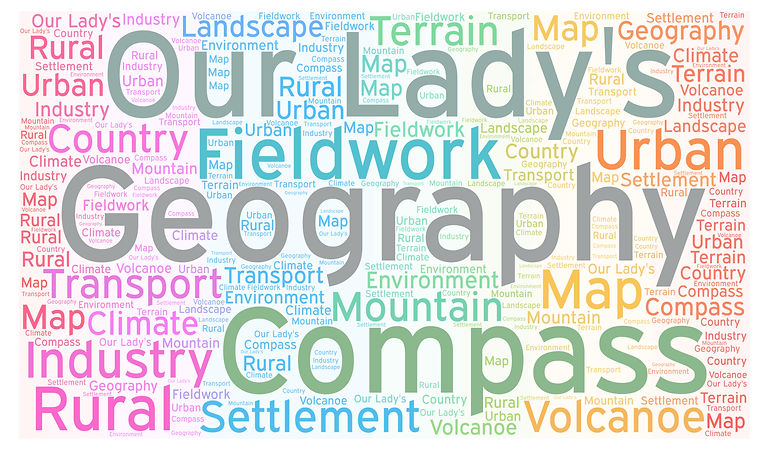
Geography

Geography Curriculum Information
Introduction
At Our Lady’s, our geography curriculum is designed with a clear intent: to develop pupils’ rich substantive knowledge of places, environments and geographical processes, alongside strong disciplinary knowledge that teaches them how geographers think, question and investigate the world. Through the Opening Worlds programme, pupils from Year 1 to Year 6 follow a carefully sequenced, knowledge-rich curriculum that builds deep understanding over time. This structured approach ensures that pupils are motivated, challenged and increasingly confident in using geographical vocabulary, interpreting information and making connections across themes, locations and scales.
The implementation of our curriculum centres on high-quality teaching rooted in the Opening Worlds materials, which provide explicit instruction, rich texts and well-designed resources. Lessons are cumulative, enabling pupils to revisit and extend prior knowledge in meaningful ways. In Key Stage 2, each year group has a planned fieldwork opportunity embedded within at least one unit, allowing pupils to apply disciplinary skills such as mapping, observing, measuring and analysing real-world data. These hands-on experiences strengthen pupils’ understanding and bring classroom knowledge to life.
The impact of this approach is seen in pupils’ secure retention of core geographical knowledge, their ability to talk with confidence about the world, and their growing skill in geographical enquiry. By the time they leave Year 6, pupils at Our Lady’s are well-prepared for further study, equipped with both the substantive and disciplinary foundations needed to understand and evaluate the increasingly complex geographical issues they will encounter.
What pupils say about Geography at Our Lady’s
-
I like Geography because you learn lots about different countries around the world.
-
I like it when we have pen pals all over the world and find out about their way of life.
-
I like learning about maps and atlases.. Maybe learning different languages.
-
Definitely learning about all the different food around the world.
Links with Tanzania
We are lucky that our very own Mr Livesey went to visit a school in Tanzania and create links with them for us to learn more about the differences in our daily lives. He brought back letters from the children there.
Mr Livsey continues to share his amazing experiences with us about his time in Tanzania. We are extremely lucky to have someone that can share stories and talk about life in another country. We are looking forward to continuing our work alongside some of the amazing people that he met.
Involvement of Parents:
Read with children – especially about other places and people.
Keep maps and globes around the house and let your children see and use them.
Look around and explore. Go exploring with them and become aware of your surroundings.
Ask questions about what you see. Ask about shape and colour and why things are located in a particular spot.
Talk about the weather and how it changes, what you wear and what you can do.
Experiment with other cultures. Eat their food and sing their songs.
Talk about where ideas, products and people come from.
Travel in different ways: Bus, car, bicycle, train. Jumping, running and climbing.
SMSC in Humanities
Humanities subjects are focused on people and their relationships and, therefore, we are well placed to contribute to students’ Spiritual, Moral, Social and Cultural education. In lessons, children are given the opportunity to either to consider the needs and experiences of others, or their own personal responses to events, problems and changes. Teachers encourage children to discuss and debate controversy within the classroom. We expect the study of Humanities subjects to affect positively the way students live their daily lives. We encourage the children to enquire, consider and question in lessons and beyond.
Spiritual
Being inspired and awed by the world around us is a key facet of the study of Geography, and one that is explicitly promoted through the study of ‘We are Britain’ (Year 2), ‘Where in the World?’ (Year 3) and ‘European Countries’ (Year 5)
Moral - Children are given the opportunity to debate and discuss moral dilemmas in different topics. In all topics there is a way to challenge children’s thinking about morality and the rights and wrongs of the modern world.
Social - Social issues and the needs of different groups of people are common themes that are explicitly recognised on a regular basis, such as ‘How has Aspull changed?’ (Year 5)
Cultural - Cultural appreciation and understanding is fundamental to learning, children are presented with authentic accounts of cultures in topics as diverse as South America, when learning about the Amazon River (Year 3); ‘European Countries: Greece, Athens’ and ‘English Settlements’ (Year 5). The contribution of different cultures to human development and progress is also explored and studied, opening children’s views and broadening horizons.
Documents
There are a number of documents that provide further information on this subject or are relevant to particular year groups. Click on the relevant title to open the document.
Title | Sub Title |
|---|---|
Geography Curriculum Overview | |
Geography Policy |






